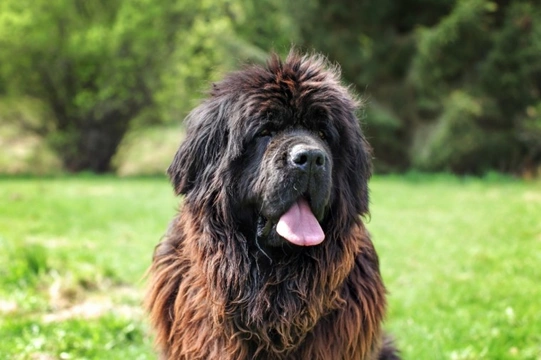
10 things you need to know about the Newfoundland dog, before you buy one
The Newfoundland is a giant dog breed that tends to not be commonly seen in the UK in large numbers, but is the type of dog that you only need to see once to remember forever! They are both tall and long as well as quite well padded, and they also have long, thick coats that further add to their bulk.
However, aside from their large size, the Newfoundland dog isn’t a particularly daunting-looking breed, and they have an appearance rather like large teddy bears, and kind faces to match.
The Newfoundland’s nice looks is matched by an equally nice temperament that ensures a host of new fans of the breed each year begin to look into the possibility of owning a Newfoundland dog of their own; but this is not a breed that is a good fit for everyone.
If you are thinking of buying a Newfoundland dog, this article will tell you ten things you need to know about the breed before you go ahead and purchase one of your own. Read on to learn more.
Newfoundland dogs are very large
The Newfoundland dog is a giant breed, and they are undeniably very large! Male Newfoundlands can stand up to around 71cm tall at the withers and weigh up to around 68kg, with females being slightly smaller.
This means that dogs of the breed need a large home, and won’t thrive in a small one!
Newfoundland dogs have webbed feet and usually love to swim
Newfoundland dogs usually have a natural affinity for water, and dogs of the breed are often keen swimmers. This reflects their historical working role as water dogs that assisted fishermen off the Newfoundland coast, and their webbed feet help them to swim effectively whilst their coats don’t hold a lot of water to weigh them down.
Newfoundlands don’t have particularly long lifespans
The Newfoundland dog is a giant breed, and giant breeds as a whole don’t tend to live for as long as their smaller counterparts, and this is the case for the Newfoundland specifically.
The average lifespan for dogs of the breed is 8-10 years, although this can of course be variable.
The Newfoundland breed as a whole has a number of health challenges
The Newfoundland breed’s health as a whole is below the average benchmark across all dog breeds, and this of course contributes to their relatively short average lifespans.
There are a number of hereditary health issues that can be found within the breed as a whole, and these include a number of hereditary heart problems, and also a high occurrence rate of both hip and elbow dysplasia.
Newfoundland dogs are quite clever
The Newfoundland dog breed is ranked in 46th place on the Coren scale of canine intelligence, out of a total number of 138 different dog breeds.
This places them in the top third out of all of the ranked breeds, and means that dogs of the breed tend to be a pleasure to train, able to learn and execute a fairly large number of commands, and are generally quite smart.
Newfoundlands are costly to buy and keep
Giant dog breeds tend to be expensive to buy and to keep, and the Newfoundland is no exception. According to our own Pets4Homes statistics, the average asking price for pedigree Newfoundland dogs for sale as of September 2019 is £1,184, and for non-pedigrees, around £892.
As a giant breed, keeping a Newfoundland tends to be expensive too, and they need everything in the largest sizes – and their size also impacts on the cost of their veterinary care and insurance as well!
Their coats are high maintenance and they shed a lot
The Newfoundland coat is long and wavy and requires quite a lot of brushing and grooming to keep it in good condition. Additionally, dogs of the breed are heavy shedders that lose quite a lot of hair all year round. They also tend to shed more heavily when the seasons change in Spring and Autumn.
They need a reasonable amount of exercise
As a large dog, the Newfoundland needs quite a lot of exercise. However, they are rather slow-moving and aren’t the types of dogs to hare around at top speed, although like all dogs they can of course be playful. A couple of walks of 45 minutes to an hour each day is generally a good match for a Newfoundland dog.
They are very good with children and protective but not aggressive
The Newfoundland dog breed as a whole is one that is particularly noted for getting on well with children, and they often have a particular affinity for them and will seek out the family children for play and companionship. The breed is also generally very gentle and able to moderate their behaviour around smaller family members to avoid harming them, and they are often very protective over family children too.
This is not, however, a breed that is generally associated with defensive aggression.
They are very kind natured in general, and loyal to their families
The Newfoundland breed as a whole is one that is kind natured and loyal, and they can make for excellent family pets. However, they do need a large home, lots of grooming, and an owner that understands the breed’s health challenges and is prepared to deal with them, starting with learning how to pick a healthy puppy from a responsible breeder.



